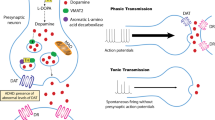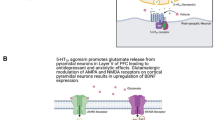Summary
It was shown in the present study that the selective non-competitive N-methyl-D-aspartate (NMDA) antagonist MK-801 [(+)-5-methyl-10,11-dihydroxy-5H-dibenzo(a,d)cyclohepten-5,10-imine] caused a pronounced and dose-dependent increase in locomotion in mice pretreated with a combination of reserpine and α-methyl-para-tyrosine. Haloperidol pretreatment did not antagonize the MK-801-induced stimulation of locomotion. The findings are discussed in relation to the concept of a corticostriatothalamocortical negative feedback loop serving to protect the cortex from an overload of information and hyperarousal. Such a feedback loop would encompass i.a. corticostriatal glutamatergic neurons and it would be modulated by mesencephalostriatal dopaminergic neurons.
Similar content being viewed by others
References
Carlsson A (1988) The current status of the dopamine hypothesis of schizophrenia. Neuropsychopharmacology 1: 179–186
Clineschmidt BV, Martin GE, Buntin PR (1982a) Anticonvulsant activity of (+)-5-methyl-10,1 1-dihydro-5H-dibenzo(a,d)cyclohepten-5,10-imine (MK-801), a substance with potent anticonvulsant, central sympathomimetic, and apparent anxiolytic properties. Drug Dev Res 2: 123–134
Clineschmidt BV, Martin GE, Bunting PR, Papp NL (1982b) Central sympathomimetic activity of (+)-5-methyl-10-11-dihydro-5H-dibenzo(a,d)cyclohepten-5,10-imine (MK-801), a substance with potent anticonvulsant, central sympathomimetic, and apparent anxiolytic properties. Drug Dev Res 2: 135–145
Clineschmidt BV, Williams M, Witoslawski JJ, Bunting PR, Risley EA, Totaro JA (1982c) Restoration of shock-suppressed behavior by treatment with (+)-5-methyl-10,11-dihydro-5H-dibenzo(a,d)cyclohepten-5,10-imine (MK-801), a substance with potent anticonvulsant, central sympathomimetic, and apparent anxiolytic properties. Drug Dev Res 2: 147–163
Gill R, Foster AC, Woodruff GN (1987) Systemic administration of MK-801 protects against ischemia-induced hippocampal neurodegeneration in the gerbil. J Neurosci 7: 3343–3349
Kim JS, Kornhuber HH, Kornhuber J, Kornhuber ME (1985) Glutamic acid and the dopamine hypothesis of schizophrenia. In: Shagass C et al (eds) Biological psychiatry. Elsevier, Amsterdam New York, pp 1109–1111
Koek W, Woods JH, Winger GD (1988) MK-801, a proposed noncompetitive antagonist of excitatory amino acid neurotransmission, produces phencyclidine-like behavioral effects in pigeons, rats and rhesus monkeys. J Pharmacol Exp Ther 245: 969–974
Kornhuber HH, Kornhuber J, Kim JS, Kornhuber ME (1984) Zur biochemischen Theorie der Schizophrenie. Nervenarzt 55: 602–606
McNamara JO, Russell RD, Rigsbee L, Bonhaus DW (1988) Anticonvulsant and anti-epileptogenic actions of MK-801 in the kindling and electroshock models. Neuropharmacology 27: 563–568
Schmidt WJ, Bubser M (1989) Anti-cataleptic effects of the N-methyl-aspartate antagonist MK-801. Pharmacol Biochem Behav (in press)
Schmidt WJ, Bury D (1988) Behavioural effects of N-methyl-D-aspartate in the anterodorsal striatum of the rat. Life Sci 43: 545–549
Sonsalla PK, Nicklas WJ, Heikkila E (1988) A role for excitatory amino acids in methamphetamine-induced nigrostriatal dopaminergic toxicity. Science (in press)
Wong EHF, Kemp JA, Priestley T, Knight AR, Woodruff GN, Iversen LL (1986) The anticonvulsant MK-801 is a potent N-methyl-D-aspartate antagonist. Proc Natl Acad Sci USA 83: 7104–7108
Author information
Authors and Affiliations
Rights and permissions
About this article
Cite this article
Carlsson, M., Carlsson, A. The NMDA antagonist MK-801 causes marked locomotor stimulation in monoamine-depleted mice. J. Neural Transmission 75, 221–226 (1989). https://doi.org/10.1007/BF01258633
Received:
Accepted:
Issue Date:
DOI: https://doi.org/10.1007/BF01258633




